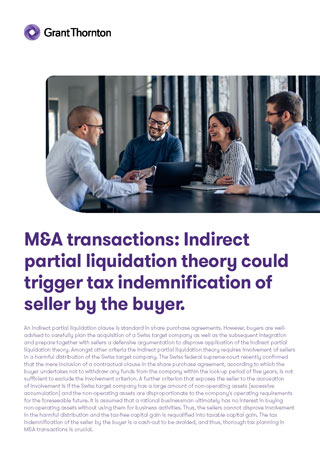-
Audit Financial Services
More security, more trust: Audit services for banks and other financial companies
-
Audit Industry, Services, Institutions
More security, more trust: Audit services for national and international business clients
-
Corporate Tax
National and international tax consulting and planning
-
Individual Tax
Individual Tax
-
Indirect Tax/VAT
Our services in the area of value-added tax
-
Transfer Pricing
Our transfer pricing services.
-
M&A Tax
Advice throughout the transaction and deal cycle
-
Tax Financial Services
Our tax services for financial service providers.
-
Advisory IT & Digitalisation
Generating security with IT.
-
Forensic Services
Nowadays, the investigation of criminal offences in companies increasingly involves digital data and entire IT systems.
-
Regulatory & Compliance Financial Services
Advisory services in financial market law and sustainable finance.
-
Mergers & Acquisitions / Transaction Services
Successfully handling transactions with good advice.
-
Legal Services
Experts in commercial law.
-
Trust Services
We are there for you.
-
Business Risk Services
Sustainable growth for your company.
-
IFRS Services
Die Rechnungslegung nach den International Financial Reporting Standards (IFRS) und die Finanzberichterstattung stehen ständig vor neuen Herausforderungen durch Gesetzgeber, Regulierungsbehörden und Gremien. Einige IFRS-Rechnungslegungsthemen sind so komplex, dass sie generell schwer zu handhaben sind.
-
Abacus
Grant Thornton Switzerland Liechtenstein has been an official sales partner of Abacus Business Software since 2020.
-
Accounting Services
We keep accounts for you.
-
Payroll Services
Leave your payroll accounting to us.
-
Real Estate Management
Leave the management of your real estate to us.
-
Apprentices
Career with an apprenticeship?!

Simplified, the Swiss tax law and practice prohibits the acquirer/buyer to extract funds from a Swiss target company (including its subsidiaries) within a five-year lock-up period i.e. mainly distributable retained earnings and non-operating business assets available at closing date as well as hidden reserves on assets, e.g. via a hidden dividend distribution, merger with group companies, loan to finance the purchase of the acquisition of the Swiss target company etc. In this case, the capital gain realized by the Swiss individual sellers could be requalified into a taxable capital gain. Such a tax burden should be borne by the seller and not by the buyers, but typically sellers hold harmless buyers if such indirect partial liquidation theory is triggered and claimed by the Swiss tax authorities.
The Swiss federal supreme court recently confirmed that the large amount of non-operating assets in a Swiss target company was obviously disproportionate to its operational requirements, which is why further retention made no economic sense and a distribution of assets was already to be expected at the time of the sale. The taxpayer/seller should have been aware, particularly due to the indirect partial liquidation clause in the share purchase agreement and the large amount of non-operating assets sold, that there could be a corresponding distribution of assets within the lock-up period of five years. In summary, the taxpayer/seller must therefore have been aware of the risk of a distribution of substance in breach of the lock-up period (knowledge element of involvement) and taxpayer/seller must have at least accepted such a distribution – due to the agreed indemnification – (will element of involvement), which means that the subjective element of (passive) involvement is given. Thus, the taxpayer/seller cannot disprove involvement in the harmful distribution and the tax-free capital gain is requalified into taxable capital gain (i.e. post-taxation at the point of sale with late interest).
Thus, it is key that buyers in coordination with sellers carefully plan the acquisition of a Swiss target company as well as the subsequent integration in the buyer structure and prepare defensive argumentation to disprove the indirect partial liquidation theory if claimed by the Swiss tax authorities. Ruling clearance may provide 100% certainty.
Grant Thornton Switzerland is well-positioned and has indepth knowledge and experience in advising throughout the transaction and deal cycle, including tax-efficient implementation planning.


